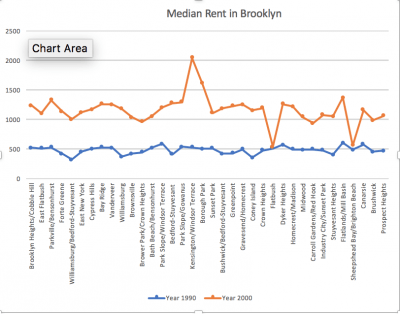The process of gentrification in urban areas can have a disastrous effect its inhabitants. The process refers to a physical, social, economic and cultural phenomenon whereby urban neighborhoods are converted into more affluent communities resulting in heightened property values and the discharge of low-income families. Gentrification happens not only all over the United States, but all over the world. On my term abroad in Washington, DC this past spring, we witnessed gentrification in its prime—we saw nicer, new buildings being constructed in a poverty-ridden area.
Due to the construction of new buildings, the area becomes more expensive to live; rents rise, and therefore, impoverished people cannot afford to live there any longer. They are forced to leave. This process, gentrification, changes areas drastically over the course of several years.
The article I decided to analyze from RacialMath looks into gentrification of Brooklyn, New York. The article, Who Hurts, by Ben Gibberd published in 2005, looks deeper into the personal problems of individuals being directly influenced by the gentrification in the area. Gibbered explains the new attractiveness of the area, and how it draws wealthy, middle-high income individuals to the area. From there, displacement occurs.
An interesting story from the article is of Ms. Anaya. She resides in an overcrowded two-family home, living with her parents, brother and twelve other tenants. The twelve other tenant include multiple children under three years old in just the upper-floor of the apartment alone. She explains the poor condition of the apartment, explaining that ”there’s a big hole in our bathroom, and hardly any heat.” And, her parents pay $1,000 a month in rent.
However, even though Ms. Anaya and her family want to move out—they cannot. Due to gentrification issues, they cannot afford a new place in Brooklyn. She illuminates these problems by saying, “”Everything’s $725,000,’ and that’s on a bad block.”
The issues raised in this article led me to another article posted on the RacialMath site. This article looks at the changes of rent from 1990 to 2000. I made a graph to show the increase in rent during the ten-year span. Due to the large increase between these two years, we can only imagine how high the rent is today in Brooklyn, 18 years later.



A topic that I think would be interesting to dive deeper into is the changes in the the character of different neighborhoods in Brooklyn. You referenced that Ms. Anaya referred to a “bad block” and I would be interested to see if any of the neighborhoods have turned good or bad based on gentrification. Perhaps violence has increased in a neighborhood due to overcrowding because the prices are cheaper. I think researching the correlation between violence/crime and gentrification would be interesting.
I found your post really interesting, and I think that increasingly gentrification is automatically assumed to have negative consequences. Yet for some people, the gentrification of their neighborhood assists them. If a homeowner sees their property values rise, they can sell that property for a greater profit, and cash in as a result. Additionally, as property values rise, so too do property taxes, and as a result the community at-large is in a better position to provide better quality schools, resources, and services to its residents. While gentrification clearly hurts many in the community, it is important too not to overlook some of its more positive impacts.
Similarly to what I commented on Marielle’s post, I think that gentrification has benefits and downfalls. While starting new businesses and renovating and creating new living spaces, it is beneficial because it can breathe new life into a run down place. But it can be detrimental, especially to residents who have lived in the area for a while. Prices increase, small businesses can be threatened, etc. So there are definitely two sides to how this affects people individually.